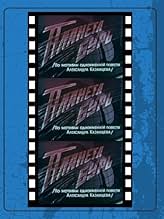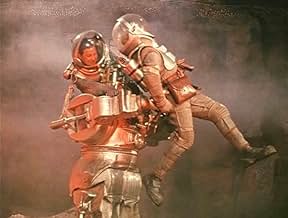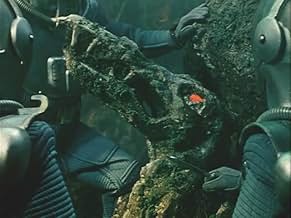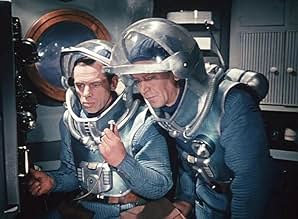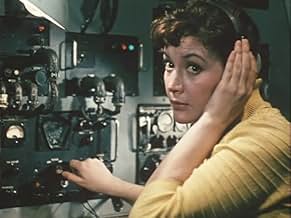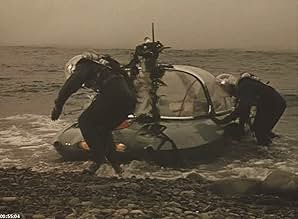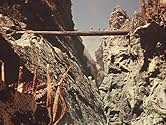Planeta bur
- 1962
- 1 घं 18 मि
IMDb रेटिंग
6.3/10
1.6 हज़ार
आपकी रेटिंग
अपनी भाषा में प्लॉट जोड़ेंCosmonauts land on the planet Venus. However, they find themselves in danger from the voracious monsters they find on it.Cosmonauts land on the planet Venus. However, they find themselves in danger from the voracious monsters they find on it.Cosmonauts land on the planet Venus. However, they find themselves in danger from the voracious monsters they find on it.
- निर्देशक
- लेखक
- स्टार
फ़ीचर्ड समीक्षाएं
"Planeta Bur" is about cosmonauts who are lost on Venus, attempting to return to the spaceship, and their adventures along the way, which include encounters with prehistoric reptiles, a volcano, and other perils. Like Ptushko's "Sadko", this is a true gem of fantastic film. The use of natural and artificial sets is very effective in creating an atmospheric, alien world; the monsters (an intelligent robot, a carnivorous plant, pestiferous lizard men, a pterodactyl, and some other dinosaurs) are similarly well done. Unlike American films of this kind, there is no emphasis on macho violence or digressions into "steamy" romance scenes; instead the film concentrates on the lavish visuals in an unhurried and dignified pace. My only complaints are that the introduction is too long and slow-moving, and that the subplot involving Masha's agonizing over the fate of her comrades isn't very interesting; but the scenes on Venus, which comprise the bulk of the film, more than make up for these flaws. "Planeta Bur" was drastically edited by Peter Bogdonavitch and released in the States as "Voyage to the Planet of Prehistoric Women"; two versions exist, one with footage of Mamie Van Doren leading a tribe of telepathic Venusian women and worshipping the pterodactyl of the original film, the other without Ms. Van Doren or any of the prehistoric reptile footage.
The russian language version is rare, but well worth seeing. If you're really curious, you can see the American version which was retitled "Voyage to the prehistoric planet" and released in 1966. Back in the early 1960s, when this film was made, the Soviets had focused thier space program on Venus. In fact, they were the first to send probes into the atmosphere, land successfully, and return pictures from the surface. It's no wonder they were inspired to produce an extravagant adventure, based on the promise of thier exploration. The story is basic and straight forward, about an expedition to the planet Venus, but the science is flawed. They encounter oceans, flooding rains, and animal life. When this film was produced, we were just beginning to discover the truth about Venus. A surface temperature at the melting point of lead. A poisinous atmospere, with crushing pressure hundreds of times as heavy as ours. No water, or oxygen, and sulfuric acid in the clouds. If you're lucky enough to run across this film, forget all that, suspend you disbelief, and enjoy this rare classic gem.
10timayres
I saw this in my childhood and took years to track it down again since I saw it under one of its two confusing Roger Corman english-language re-edits [Voyage to the Prehistoric Planet with Basil Rathbone added, and Voyage to the Planet of Prehistoric Women, with mermaids scenes directed by Peter Bogdonavich.] Finally able to track down the original Russian version recently, I was able to fully appreciate the ambitious scope and production values. The forest is truly primeval in its detailed beauty, Robot John both heroic and sad in his dedication, and the ending poetic and lyrical. Non-U.S. science fiction films are doubly exotic, and this one is classic fare.
It doesn't compare with modern day films at all, but then one shouldn't try to, should one? Gee they all (and probably "we too") took themselves so seriously those days!!
I'm confused by one previous commentator who said the film was in black and white. Maybe her TV was, but the film as I saw it last night certainly was in colour (well, 1960s colour, anyway).
One quote from the film certainly is worth commenting. That's where they are speculating that there may have been creatures who crashed their spaceship a long time ago and then turned feral. The character comments that they would have had "no culture". Well, that's the Eastern European way, isn't it? Culture is so important; but what they can't seem to perceive, so useless. As author Stephen Coonts said of the Russians: "They can all write poetry but not a single one of them can change a light bulb" (well something like that, anyway).
But putting that to one side, yes a most interesting and well-made film of its time. The singing absolutely blew me away. Not the quality of the singing, I mean the fact that they had singing at all in what otherwise seems to me such a "serious" movie!
I'm confused by one previous commentator who said the film was in black and white. Maybe her TV was, but the film as I saw it last night certainly was in colour (well, 1960s colour, anyway).
One quote from the film certainly is worth commenting. That's where they are speculating that there may have been creatures who crashed their spaceship a long time ago and then turned feral. The character comments that they would have had "no culture". Well, that's the Eastern European way, isn't it? Culture is so important; but what they can't seem to perceive, so useless. As author Stephen Coonts said of the Russians: "They can all write poetry but not a single one of them can change a light bulb" (well something like that, anyway).
But putting that to one side, yes a most interesting and well-made film of its time. The singing absolutely blew me away. Not the quality of the singing, I mean the fact that they had singing at all in what otherwise seems to me such a "serious" movie!
Not bad, not incredible like "Forbidden Planet" and not as colourful and tragic as "This Island Earth" and it is certainly not "Solaris". But we must give 60s Eastern bloc science fiction its due. None of it is bad. All of it respects the intelligence of the viewers and each manages to create effective atmospheres. The music and background sound were good. The robot and the "supercar" are dated but very good for the time. Naming the robot "John" is a bit of a dig at the West (one could just as easily see Westerners naming a robot Ivan or Igor). The robot is given a Western name while the crew are all self actualized socialist men except for the woman cosmonaut who is given the traditional role of minding the mothership and lamenting over the fate of the men who are off exploring the planet. If that and the song are the social commentary then it could have been much worse.
क्या आपको पता है
- ट्रिवियाThis movie is later edited and dubbed as "Voyage to the Prehistoric Planet", released in the US in 1965. This movie (and the Russian inserts) were in turn used to create "Voyage to the Planet of Prehistoric Women" (1968)
- इसके अलावा अन्य वर्जनFor the U.S. version, titled Voyage to a Prehistoric Planet (1965), all footage of Kyunna Ignatova has been removed and replaced with footage of American actress Faith Domergue playing the same part.
- कनेक्शनEdited into Voyage to the Prehistoric Planet (1965)
टॉप पसंद
रेटिंग देने के लिए साइन-इन करें और वैयक्तिकृत सुझावों के लिए वॉचलिस्ट करें
- How long is Planeta bur?Alexa द्वारा संचालित
विवरण
- चलने की अवधि1 घंटा 18 मिनट
- ध्वनि मिश्रण
- पक्ष अनुपात
- 1.37 : 1
इस पेज में योगदान दें
किसी बदलाव का सुझाव दें या अनुपलब्ध कॉन्टेंट जोड़ें


